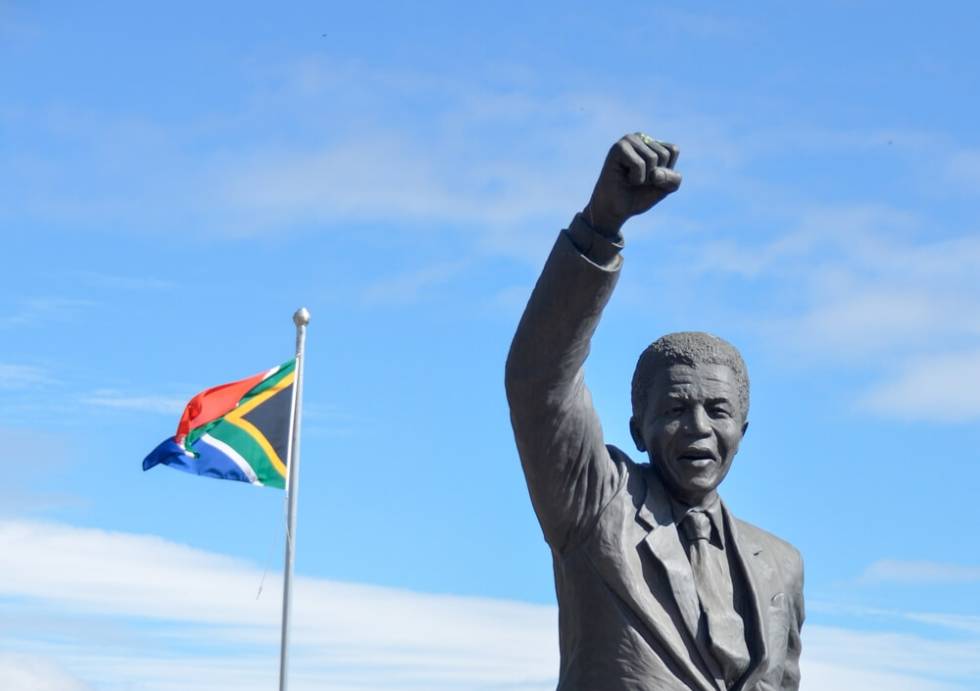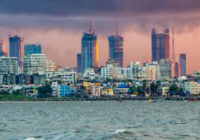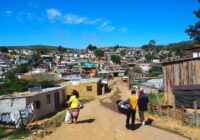South Africans go to the polls on May 29 in the most fiercely contested election since the end of apartheid 30 years ago. The latest polls suggest that the ruling African National Congress (ANC) will, for the first time, get fewer than 50% of the votes. If this occurs, they will will have to seek allies to govern.
Most reporting is from the cities and urban areas, but a third of the electorate lives in rural areas. I went to Napier, some 170 kilometers southwest of Cape Townhome. This town is home to around 5,000 people.
“I grew up in the days of ‘two doors,’” John October tells me, recalling the days of apartheid. Back then, shops, train stations and official buildings had one door for whites and another door through which people of color would be allowed to enter. They were bitter times for people like October , who was classified as “colored,” of mixed racial ancestry. He stands in front of a wall of family photographs explaining what he had to deal with over the years. Some are of weddings and births, others sports, but many show him sitting on committees where he served after the end of official discrimination in 1994. October was a councilor for the ANC in Napier from 2006 to 2011.

John October revels in his councilor days. Author’s photo.
October was also a postman. “The ANC came to see me because they couldn’t win Napier,” he explains. “But I knew everyone.” He is immensely proud of his achievements in office. October drives me around, showing the health centre, library and school that he campaigned to get built. Housing was perhaps his proudest achievement. He shows me the 250 homes that he pushed for in what is called “Smartie-town” — after the multicolored sweets, because of the brash colors the houses were painted in.
Related Reading
October has retired from politics and now looks somewhat wistfully back, but without regret. He worries about his people, who still have to cope with overcrowded houses, poor education and endemic drug use. “Times are hard, but what can you do?” he says, with a broad smile. October won’t say how he will vote, but he is clearly not impressed with the ANC government’s delivery.
Napier is not Cape Town
Napier, like all South African urban areas, still bears the scars of apartheid. People of color live in one part of the town and whites in another. There is no law for this, but prices of property and differentials of wealth and income take their toll, even though there are some signs of change.
This is a small town that attracts people who want to leave the big cities to seek a quieter life and an alternative lifestyle. Nelis Singels is one of them. He moved with his wife and two children to Napier after giving up a profession in conservation to pursue his passion for art. A skilled ceramicist and sculptor, he has a gallery on the high street, which is where we meet.

Nelis Singels poses with his art. Author’s photo.
“The ANC are playing the race card to win votes,” he tells me. “They make promises just to get people to the polls. But after the election what will happen?” Key services such as electricity and water have failed across the country, and there are fears that they will fail again as soon as the election is over. Singels loves Napier, where his family can thrive. He won’t be voting for the ANC or its main rival, the Democratic Alliance (DA), which runs this town and the Western Cape in which it is situated. He worries about budget cuts for the town, which relies on grants from the central government. “I want someone who will look after the interests of my people,” he explains. As a white Afrikaner, identity is still as critical as any other factor for him.
I meet Karen Donald in a busy café that serves the passing trade as well as locals. She’s a warm, bubbly woman, and our conversation is repeatedly interrupted as she greets people coming and going. Donald is a DA councilor for Napier. Their authority has won plaudits for running a non-corrupt, efficient administration. That’s something of a rarity in South Africa, where local governments have either collapsed or are delivering few services to their people.

Councilor Karen Donald is a personable lady and approachable by all.
Donald is anything but complacent. “How do I get government ministers to take any notice of our bridge?” she asks. “It’s in a terrible condition and needs repairs.” The bridge was a victim of local floods, but getting the resources and expertise to get it mended is no easy task.
It is just one of the issues confronting the town. It may look inviting and charming to visitors passing through, but it has real problems. There is a large shanty town, which houses the growing African population which arrives from across the country and the continent, hopeful for jobs, which this province has managed to provide while others have failed.
Related Reading
The DA may get the credit for running efficient administrations, but it has many critics. Parties have mushroomed, and both the governing party and the opposition have seen their vote shares eroded. The DA may win in towns like Napier, but across the nation, it looks unlikely to increase its vote share much beyond 23%.
A coalition government is likely to emerge after this election. Coalitions have been administering a rising number of local governments across the country for some years. Many have proved to be unstable and prone to collapse. The people of quiet towns like Napier enter this year’s election with more than a little apprehension about their political futures.
The views expressed in this article are the author’s own and do not necessarily reflect Fair Observer’s editorial policy.
Support Fair Observer
We rely on your support for our independence, diversity and quality.
For more than 10 years, Fair Observer has been free, fair and independent. No billionaire owns us, no advertisers control us. We are a reader-supported nonprofit. Unlike many other publications, we keep our content free for readers regardless of where they live or whether they can afford to pay. We have no paywalls and no ads.
In the post-truth era of fake news, echo chambers and filter bubbles, we publish a plurality of perspectives from around the world. Anyone can publish with us, but everyone goes through a rigorous editorial process. So, you get fact-checked, well-reasoned content instead of noise.
We publish 2,500+ voices from 90+ countries. We also conduct education and training programs
on subjects ranging from digital media and journalism to writing and critical thinking. This
doesn’t come cheap. Servers, editors, trainers and web developers cost
money.
Please consider supporting us on a regular basis as a recurring donor or a
sustaining member.
Will you support FO’s journalism?
We rely on your support for our independence, diversity and quality.












Comment